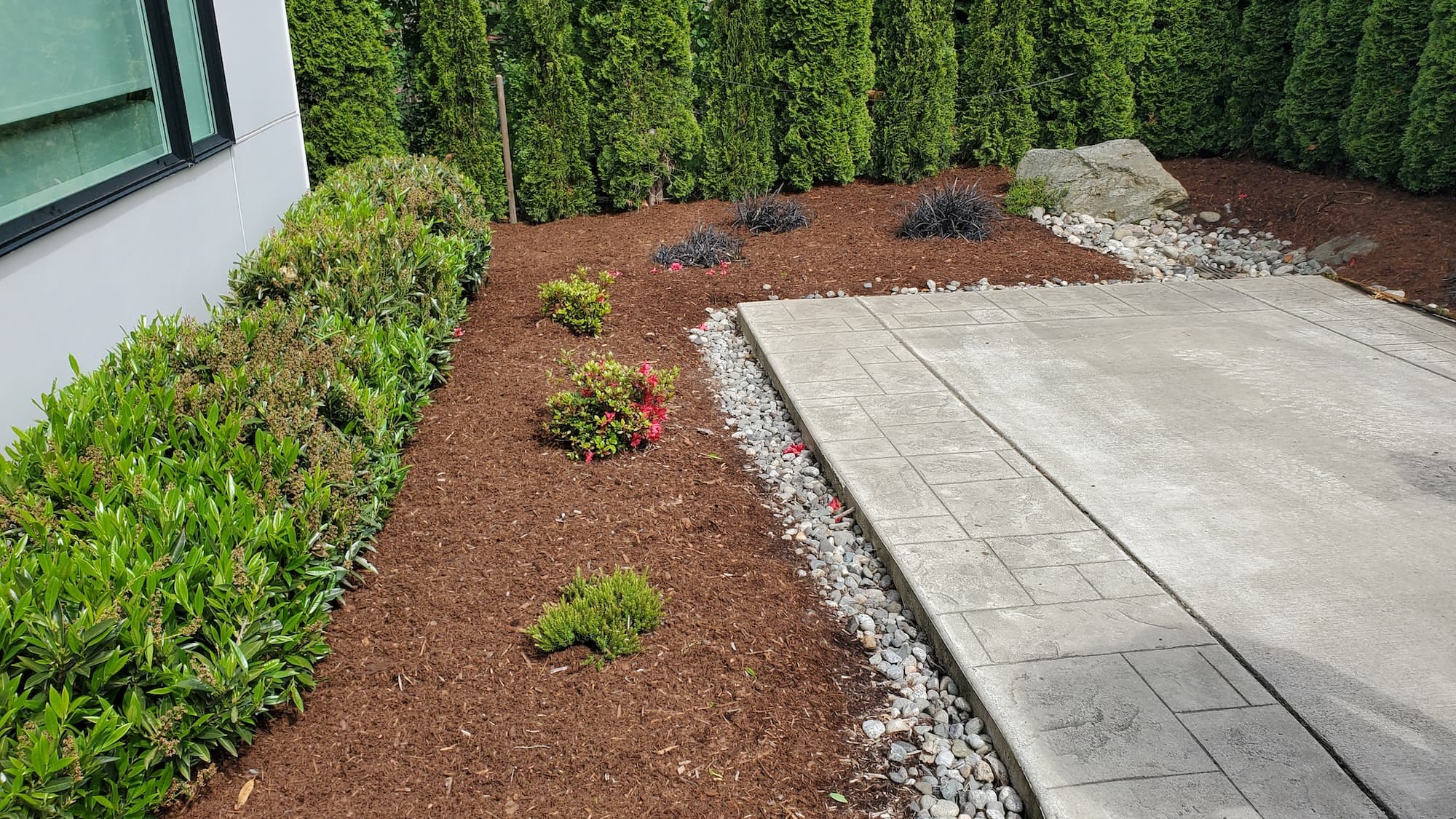West Seattle Storm-damaged mulch removal
Homeowner’s Issue
West Seattle properties take a beating in late fall and winter storms. Heavy rains, wind-driven debris from Puget Sound, and run-off from steep residential hills — Admiral, Alki, and the Delridge slopes — strip or compact mulch. Many yards here have thin topsoil over glacial till and pockets of clay, so when mulch is displaced you often end up with bare compacted soil that channels water, buries plant crowns, and invites moss and invasive ivy. North- and west-facing beds under dense evergreens stay damp most of the year; south-facing beds on exposed bluffs dry faster but suffer from wind-scatter and salt spray.
Homeowner complaints we see most: washed-out mulch, mulch mixed with silt, mulch piled against foundations or storm drains, and mulch contaminated with broken branches. HOA guidelines in some Admiral and Fauntleroy neighborhoods prefer tidy, low-profile beds and defined edging; storm damage that leaves ragged edges can be cited. Seattle’s rainy season means timing matters—late winter storms will undo a spring job if the grade and anchoring aren’t fixed. Our focus is sustainable fixes: remove damaged material, correct grades or drainage, and replace with organic mulch and mechanical or manual weed control—no herbicides—so your beds hold up in the next wind and rain cycle.
Our Quality Service
We remove and replace storm-damaged mulch using hands-on, sustainable methods. Our crew assesses grading and runoff paths, hand-pulls invasive roots, rakes and screens out silt, and regrades where needed to divert water from foundations and pathways. We use wheelbarrows, tarps, leaf blowers (after work), rakes, and a small shredder when appropriate to recycle clean wood debris onsite.
Typical timelines:
- Small front beds: 2–4 hours.
- Medium yard (standard West Seattle lot): half day.
- Larger or slope/terraced jobs: full day with crew and haul-away.
We avoid chemical herbicides. Options include sheet-mulch anchoring, landscape fabric (only where breathable), or mechanical edging to reduce future washout. Benefits: safer walkways, cleaner storm-drain lines, better curb appeal for Alki and Admiral streets, and lower ongoing maintenance.
What’s Included
- Full site assessment and written notes about drainage and grades.
- Removal of storm-damaged mulch and separation of reusable material.
- Hand-weeding of visible invasive roots (ivy, blackberry runners).
- Light soil decompaction and regrading where needed to stop channeling.
- Application of fresh organic mulch to recommended depth.
- Clean haul-away of debris or green-bin drop-off (your choice).
Options / Upgrades
- Heavy compost/top-dress to amend compacted spots.
- Landscape fabric under mulch (breathable type) for high weed pressure spots.
- Haul-away vs. green-bin drop-off (we’ll confirm local pickup rules).
- Gravel or permeable edging for paths and steep banks.
- Sheet-mulch (cardboard + compost + mulch) for persistent weed patches.
Before & After / Expectations
Be honest about access: we need clear access to beds; tight alleyways or steep stairs add time. Expect some noise (rakes, blowers, truck) and a short-lived debris pile while we sort material. Typical cleanup leaves the yard tidy the same day; heavy jobs with multiple wheelbarrow loads may require a trip to the green waste facility the same week.
Aftercare tips for West Seattle:
- Best time to re-mulch is after the heaviest rains subside (late spring) or late summer before fall storms.
- Don’t pile mulch against trunks or siding; keep a 2–3” gap around stems.
- In shady, damp spots expect moss and weed pressure in early spring—manual cleanup in March–May is normal.
- If slopes are an issue, consider permeable edging or light terracing to slow runoff.
FAQs
Q: Will you use herbicides to stop regrowth?
A: No. We use only mechanical and organic methods—hand-pulling, sheet-mulch, and compost/top-dress.Q: How soon can you schedule after a storm?
A: Typically within 1–2 weeks for most West Seattle jobs; urgent storm cleanup can sometimes be scheduled faster depending on workload.Q: Do you haul away the old mulch?
A: Yes — choose haul-away to green bin, compost, or we can leave on-site if you plan to reuse clean material.Q: What if my bed is on a steep public-facing slope (Admiral/Alki)?
A: We anchor mulch with edging, stabilizing plants, or permeable gravel bands to reduce future wash-off.
Call to Action
If your West Seattle beds look washed out after the last storm, book a quick estimate. We prioritize local homeowners from Alki to Fauntleroy and are realistic about what holds up in our microclimates. Fast scheduling, clear pricing, and sustainable methods — no herbicides.
Email neatandtidyseattle@gmail.com to send photos or request a free estimate. Phone: 206-538-9344.










